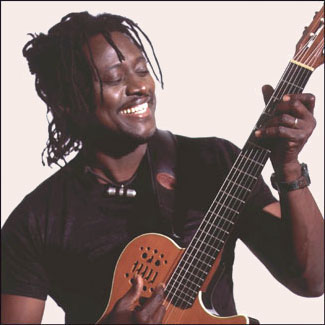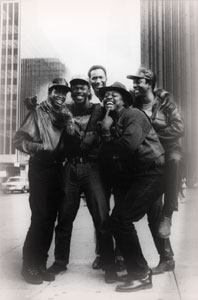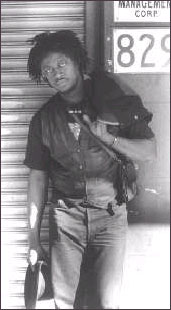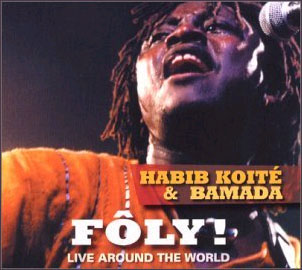 For
nearly two hours on a Tuesday evening in February, Malian guitar
virtuoso Habib Koite and his six-piece unit, Bamada, brought a level
of ensemble mastery to Memorial Hall in Shelburne Falls,
Massachusetts, that would have been the envy of any world class
chamber group. The sold-out performance was part of the eclectic
Hilltown Folk series, which increasingly draws folk and world
music headliners to the upper Pioneer Valley. At concerts of
predominantly amplified instruments and voices, I consider it just
short of miraculous if the sound gets tolerably balanced within ten or
fifteen minutes. From the beginning, Bamada’s balance was impeccable,
offering crystal-clear definition to each instrument’s personality and
their polyrhythmic conversations. With hindsight, I shouldn’t have
been surprised—polyrhythmic and textural clarity are central to Koite’s musical agenda. For
nearly two hours on a Tuesday evening in February, Malian guitar
virtuoso Habib Koite and his six-piece unit, Bamada, brought a level
of ensemble mastery to Memorial Hall in Shelburne Falls,
Massachusetts, that would have been the envy of any world class
chamber group. The sold-out performance was part of the eclectic
Hilltown Folk series, which increasingly draws folk and world
music headliners to the upper Pioneer Valley. At concerts of
predominantly amplified instruments and voices, I consider it just
short of miraculous if the sound gets tolerably balanced within ten or
fifteen minutes. From the beginning, Bamada’s balance was impeccable,
offering crystal-clear definition to each instrument’s personality and
their polyrhythmic conversations. With hindsight, I shouldn’t have
been surprised—polyrhythmic and textural clarity are central to Koite’s musical agenda.Fronted by
Habib’s beguiling voice and his nuanced, amplified acoustic guitar
work, Bamada—which means mouth of the crocodile—also featured the
73-year-old virtuoso Keletigui Diabate on violin and balafon—a
wooden-key African cousin of the xylophone. The other musicians were Boubacar Sidibe on guitar and harmonica, Abdoul Wahab Berthe on
electric bass, Souleymane Ann on Western drum kit and calebas se
(calabash), and Mahamadou Kone on talking drum and a grab bag of
percussion instruments. se
(calabash), and Mahamadou Kone on talking drum and a grab bag of
percussion instruments.
From Bamada’s first note, polyrhythms ruled
the day. This is one extraordinary polyrhythmic machine, I told
myself. But the machine metaphor didn’t do the band justice, because
its interplay was utterly organic. In that seamless cohesiveness,
Koite’s own musical personality was central. From his dreads-in-motion
image on posters and cds, you’d expect a wild and crazy stage
presence. Not for a moment. On stage, he was humility incarnate,
providing through leadership and musicianship the unifying force that
kept Bamada’s musical ingredients in sync.
Koite’s characterization by publicists as the
African Eric Clapton is more marketing invention than musical
reality. Like Clapton’s guitar work , Habib’s was technically
masterful and nuanced, but the similarity ended there. Clapton crafts
lengthy lines that move toward harmonic-rhythmic payoffs. Koite’s
largely nonlinear approach dwelled within each chord, exploring
its anatomy through ingenious combinations of rhythms, trills, and
note juxtapositions. In addition to traditional Malian motifs, Koite’s
playing incorporated stylistic ingredients from flamenco, Afropop,
samba, and American jazz and blues. But his guitar lines rarely
resolved according to Western harmonic expectations. Instead they
found resolution through fleeting melodic riffs that often dovetailed
with ingenious intersections of rhythms, timbres, and dynamics.
Koite’s gorgeous three-octave voice was no
less distinctive. With the burnish ed
quality of teak or rosewood, it consistently emerged from Bamada’s
instrumental fabric, leading the band forward. And it drew periodic
vocal responses from other band members, who sang in unison or one-
and two-step intervals. ed
quality of teak or rosewood, it consistently emerged from Bamada’s
instrumental fabric, leading the band forward. And it drew periodic
vocal responses from other band members, who sang in unison or one-
and two-step intervals.
On balafon and violin, seventy-something
Keletigui Diabate was the band’s big improvisational risk taker. His
playing packed more linear punch than the leader’s. At the same time,
Diabate piled up notes vertically in inventive rhythmic combinations.
Three-quarters through one of his too-infrequent violin solos, Diabate
joined forces with Koite in an improvisational duet with Habib
perfectly echoing his senior’s increasingly complex phrases. The
escalating energy was a high point of the concert. Another galvanizing
presence was the percussionist, Mahamadou Kone, who employed a curved
wooden beater to produce riveting percussive accents (including
elastic changes in pitch) from a talking drum. At times, the mercurial
Kone bounded about the stage, stoking the energy levels of the other
musicians.
By blood line and vocation, Koite is a
griot—a Malian song-story teller who musically transmits Malian
cultural myths and history. That history spans centuries and
encompasses dynasties of former monarchs who ruled what was once one
of west Africa’s most powerful kingdoms. Many griots were court
musicians who deployed bardic song to celebrate the kings, their
ancestors, and Mali’s rich cultural traditions. Koite’s music
continues that exploration and current topics like urbanization and
the evils of cigarettes. Few in the hall, of course, had a clue about
what Koite was singing. But no one seemed to mind. Bamada’s energy
level and ensemble playing were continuously compelling.
Koite and Bamada share exalted company with
fellow Malian Rokia Traore, who like Bamada combines traditional and
modern elements with exquisite ensemble playing. When I heard Rokia
and her band at the Iron Horse in Northampton, Mass. several summers ago, I was bowled over.
For me, their ensemble work and strategic deployment of every musical
element was revelatory. This is a fresh, new aesthetic, I told myself,
that stands with the best music-making that any culture or genre has
to offer. On February 1st in Shelburne Falls,
 it
was a blessing to revisit that aesthetic through the inspired
performance of Habib Koite and Bamada. it
was a blessing to revisit that aesthetic through the inspired
performance of Habib Koite and Bamada.
The next best thing to being there is hearing
Koite’s double record concert cd-Foly! Live around the World-on the
World Village label. The disc’s eighteen tracks offer unabridged
performances, many of which exceed ten minutes. And Foly! is priced at
two discs for the price of one.
For an illuminating, entertaining audio
introduction to Mali’s diverse, dynamic music, listen to Lucy Duran’s
BBC presentation via the following link:
http://www.bbc.co.uk/radio3/world/guidemali.shtml
|